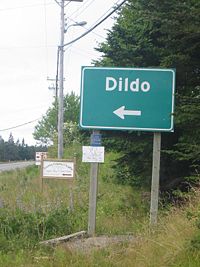- Dildo, Newfoundland and Labrador
-
Dildo is a town on the island of Newfoundland, in the province of Newfoundland and Labrador, Canada. It is located on the southeastern Dildo Arm of Trinity Bay about 60 kilometres west of St. John's. South Dildo is a neighbouring unincorporated community. The town's unusual name has brought it a certain amount of notoriety in the same vein as Fucking, Austria; Anus, France; Nob End, England; Twatt, Scotland and Wankum, Germany.[1][2][3]
Name
The place name "Dildo" is attested in this area since at least 1711, though how this came to be is unknown. The origin of the word "dildo" itself is obscure; it was used as early as the 16th century for a cylindrical object such as a dildo glass (test tube), for a phallus-shaped sex toy, as an insult for a "contemptuous or reviling" male, and as a refrain in ballads.[4] The name, then written as "Dildoe", was first applied to Dildo Island, located offshore from the present-day town of Dildo. This use was recorded in 1711 and 1775, and the name was thereafter applied to the Dildo Arm of Trinity Bay and other local physical features. Social scientist William Baillie Hamilton notes that Captain James Cook and his assistant Michael Lane, who mapped Newfoundland in the 1760s, often displayed a sense of humour in the place names they chose, and were not above selecting names that might offend overly sensitive readers. Regardless of the origin, the name has brought the town of Dildo a measure of notoriety that is not welcomed on all fronts. In the 20th century there were several campaigns to change the name, though all failed, because the people of Dildo have decided they would like to keep the name.[5]
History
The Dildo area has a long history, going as far back as 2000 BC when Maritime Archaic aboriginal people resided at Anderson's Cove. By 700 AD, people of the Dorset culture inhabited Dildo Island. In 1613, Henry Crout, whilst sailing up Dildo Arm, came in contact with the Beothuks, who were residing on Dildo Island at this time. He traded with them and left gifts. In 1711 the inhabitants of Trinity Bay were ordered by Governor Crow to leave their homes during the winter, to defend themselves against the French who burned their houses. Dildo Island was one of the places designated for this purpose. The town of Dildo was founded in the late 18th century and settled to exploit the abundance of marine resources such as fish (mostly cod), whales and seals.[6]
References
- ^ http://www.masalatime.com/?p=831
- ^ "History of Dildo Name". Kountry Kravins n' Krafts. 2005.
- ^ Pitt, Steve (May 1, 2004). "You Name It, We’ve Got It". Legion Magazine. Royal Canadian Legion. http://www.legionmagazine.com/en/index.php/2004/05/you-name-it-we%E2%80%99ve-got-it/. Retrieved 2010-08-15.
- ^ "Dildo (1.)". Oxford English Dictionary. June 1989. http://dictionary.oed.com/cgi/entry/50064101?query_type=word&queryword=dildo&first=1&max_to_show=10&sort_type=alpha&search_id=KRMF-rQ3YjR-3884&result_place=1. Retrieved October 6, 2010.
- ^ Hamilton, William Baillie (1996). Place Names of Atlantic Canada. University of Toronto Press. ISBN 0802075703. http://books.google.com/books?id=UAvyE0pN5akC&printsec=frontcover&cad=0. Retrieved October 6, 2010.
- ^ Petty, Andrew D. (2008). "The History of All Saints'". All Saints' Anglican Church. http://allsaintsdildo.webs.com/history.htm. Retrieved 2010-08-15.
Coordinates: 47°33′52″N 53°32′57″W / 47.56444°N 53.54917°W
Categories:- Populated coastal places in Canada
- Designated places in Newfoundland and Labrador
- Towns in Newfoundland and Labrador
- Populated places established in the 1800s
Wikimedia Foundation. 2010.

